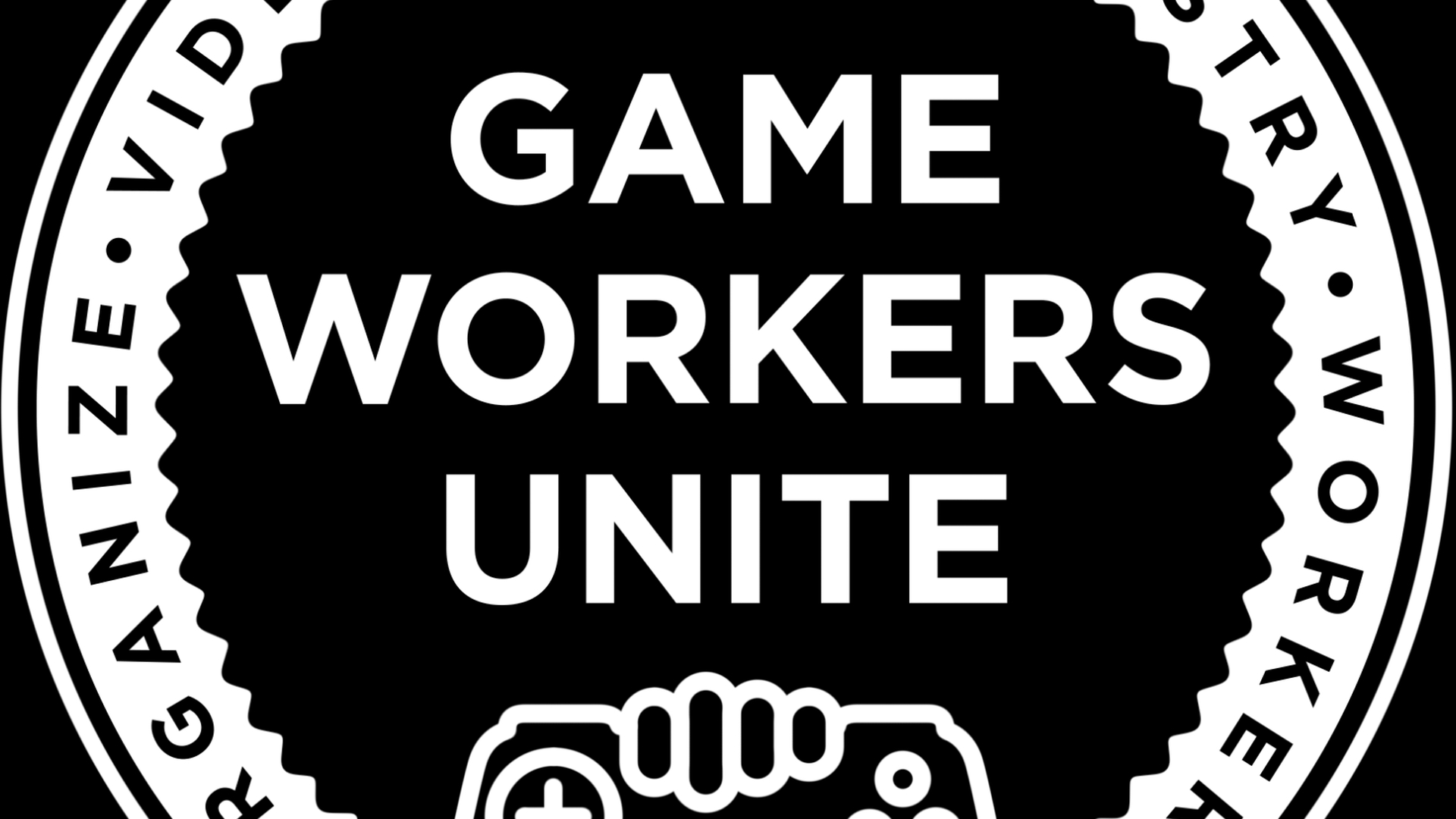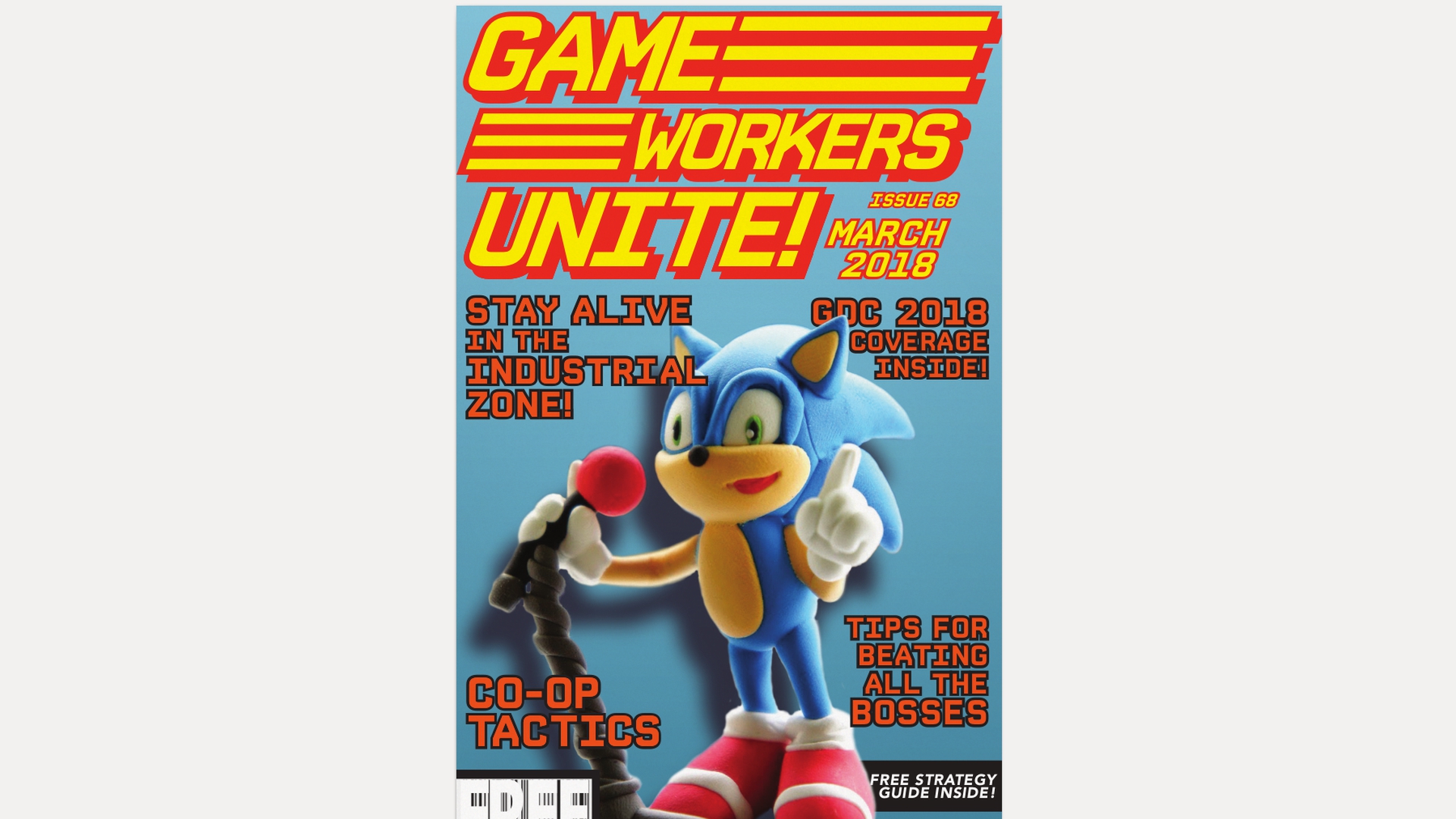Prospects for Organising the Videogames Industry: Interview with Game Workers Unite UK
by
Declan,
Jamie Woodcock (@jamie_woodcock)
August 16, 2018
Featured in The Worker and The Union (#3)
The first steps to a Game Workers Union

inquiry
Prospects for Organising the Videogames Industry: Interview with Game Workers Unite UK
The first steps to a Game Workers Union
Jamie sat down with Declan, the lead organiser of Game Workers Unite UK, to talk about unionising the videogames industry. We have previously featured the zine in issue 2, and this interview is intended to follow up with what is happening in the UK.
Jamie is an editor of Notes from Below
Declan is the lead organiser of Game Workers Unite UK
Organising in the videogames industry
Can you introduce yourself?
So I am Declan, I am a junior game designer just starting out my career and I’m also the acting organiser for Game Workers Unite, United Kingdom. Earlier this year at GDC [the Game Developers Conference], Game Workers Unite in the US was doing a lot of campaigning. One of the flyers got screenshotted I went to their website and I read it. I was like: I’m really really interested in unionisation, I’ve got a background with unions, and I’m pretty passionate about it, so I gave them an email straight away and said “hey I want to join!” A couple of weeks later they said: “we need to establish international chapters and someone needs to do a UK chapter.” I was not expecting it to be me, and then everyone was like “cool let’s do it.” So I thought, ok, I’ll guess I’ll do it. So now yeah, I’m doing all I can to help the cause.
You mentioned you have a background with trade unions, is that something that is relatively rare amongst game developers?
Yes, well I don’t know anyone else that does. Both my parents were big trade union reps in the public sector.
So why do you think Game Worker Unite is happening now?
The industry is just at that point where, not just the games industry, it’s like politics in general, we’ve got to that point where sort of left ideas, unions and whatnot, people are actually questioning: “hey, why are people not in unions anymore?” “why is the tech industry and silicon valley not built like other industries where there are actual protections for workers?” I think everything built up with people asking these questions and I think someone finally just took the initiative. As soon as someone did, everyone jumped on it, because I think everyone who is involved right now has just been expecting some people to start it, and then they can jump on it, I know I was. It reached that critical point.
Do you think part of it is that the industry is changing?
Its slowly been changing I think. The things with the games industry is that, especially with Triple-A [games produced and distributed by major publishers], things have been going more and more towards these ridiculously high-fidelity projects that take longer and longer, and its putting more and more stress on the workers. Despite some push back against crunch, crunch is still a proper terrible thing that happens in Triple-A. At the same time there’s developing more and more of a gig economy with indies [independent studios]. It’s becoming really hard to make much money as an indie because the market is very saturated, and I think a lot of employers started to take advantage of that and people are just noticing that it is becoming harder to be a game developer because of all that.
That does sound like the industry is shifting. Would you say that conditions are eroding across the board?
The thing with games is that ten years ago, if you were a game developer, you’d be like: “cool, that’s interesting”. Nowadays, it’s this big idealised career that everyone wants and employers have started to realise: “hey, I can basically say to my employees, what are you doing, this is your dream, you don’t need to have secure hours or a long term contract, in fact, you want to do this.” It’s like: “this is your passion.” No! I think that’s something that is slowly becoming apparent with Triple-A employers, they have sort of taken for granted the passion that developers have. Unlike careers with similar skills, like a graphic designer or a software developer, where on average you make like a quarter more money and on average with way better hours and contract, even though it is pretty much the same skill sets. This is just because its games!
Is this something you’ve experienced starting out in the videogames industry? Can you tell us about what you do?
I’m a game designer, but at the same time I am sort of building myself up to be in the gig economy, because I know it’s almost kind of inevitable for me. So, I’m a game designer, I do design stuff like visual scripting, working with programmers, working with the dev team, audio, sitting in a room for an hour throwing ideas at a wall and then telling the programmers how to do it. At the same time I also do programming, do a bit of art, and I also try to make money on the side doing stuff like that as well. It’s just necessary at this stage of my career and with the state of the market, to diversify my skillset. But, overall I go for design positions.
In those designer roles, how much of your work do you see in a finished game?
It depends on the size of the game. The last thing that I was working on was a VR title, made by a small indie, about ten people. I’d say about a tenth of the work, so like for me it was all of the level flow, all of the scripted events, those were my decisions. The positioning of certain items around the VR space, that was me spending ages figuring out exactly the right place to put it and testing it and going back and testing it again. It depends on how different companies do it. Say if I was to work on a big Triple-A title where there are lots of different levels, maybe one level is my brain child, or a little bit of every level or some of the UI. It would be a much smaller impact on a much larger product.
Ok so in that context, what do you see as the things workers could do with the union?
Crunch. The process in the games industry with employers just saying so were a month away from the end of the project – well three months actually – everyone has to work overtime, it’s in your contract that you have to do it unpaid. It’s bad practices like that, that happen in the industry all the time – and stuff that I was saying already about how things with similar skills in other industries get paid way more and have way more secure contracts for longer periods. We want to be able to negotiate with employers to try and put ourselves on a more even playing field. There was a recent article about how on average people go into the game industry for about three years and then leave because they realise that this is the case. That they are basically being had by employers, because everyone wants to work on games and employers know that and so they burn them out and then bring in someone else. So yeah, it’s like burnout if I were to sum it up, that and gender representation and racial representation and stuff like that. It’s still really bad in the games industry.
In what ways could this be addressed through a union?
If we could just have a platform to stand together and negotiate and organise and be like: “hey listen, loads of your workers are with us and we’ll be able to go on strike or take any action that’s needed!” Then we would be able to negotiate to make sure that we have better conditions and better representation.
What kind of action are you thinking of? How would that work differently with videogame workers?
Ok, so imagine we’re talking about a big Triple-A studio, we would want to organise the majority of some departments, because if we were able to say we’ve got like 60% of the art department on our side, that’s enough to cripple production. It’s not as bad with small indies, because you hold way more sway, but if a small indie had lots of other developers backing them, it would put them in a better negotiating position.
If you had other developers backing you up, how would it help?
Good point, but yeah I think it would. The power to shame an employer is pretty powerful. With that shaming, other developers could see union people negotiating for better contracts. Then they might think: “why can’t I just leave here if you’re not going to give me the same fair deal that people I know have.” It’s like back in proper unionised industries, you want to go to a union place. If you work in a factory, you want to go to a union factory. I guess if they want good developers, we want to be able to encourage indie developers to say: “we’re a union studio.”
I want to go back to when you talked about crippling production, would that be like calling a strike in one section of the factory?
In game development everyone is constantly interacting with everyone else. If suddenly you had nobody to talk about for design decisions, or nobody to give you new art assets, or nobody to do any of the code, in any of those situations you would stop, everything stops. So, it’s like an assembly line, it’s like a huge network. With my job, with just ten people, I’m interacting with all of the programmers and all of the artists every day, I wouldn’t be able to do my job without them. If the artists went on strike it would bring the entire studio to a halt. We, the designers and the coders, would just have to make cubes.
Amazing! So, do you think unionising the games industry will be like unionising before?
I think it would work as a traditional union as we can do the same things that like a factory used to do. So, we could negotiate if they say get rid of half the artists. It’s something we don’t know yet. We want to talk to different tech workers unions and figure out exactly how they organise themselves because at the moment I have no idea. They could have a completely different structure that works better for tech workers, but it’s a process, and we are figuring it out in practice.
What do you think the next steps are?
The next steps are basically just seeing who can help us organise and actually show the current people who’ve signed up for this, and the people outside “hey, we’re actually taking meaningful steps to organise, so organise with us, and hopefully we can organise together and decide as a collective what direction we want to go, to actually get union recognised status.”
Featured in The Worker and The Union (#3)
Subscribe to Notes from Below
Subscribe now to Notes from Below, and get our print issues sent to your front door three times a year. For every subscriber, we’re also able to print a load of free copies to hand out in workplaces, neighbourhoods, prisons and picket lines. Can you subscribe now and support us in spreading Marxist ideas in the workplace?
Read next

Game Workers Unite Zine
by
Game Workers Unite
/
March 30, 2018

